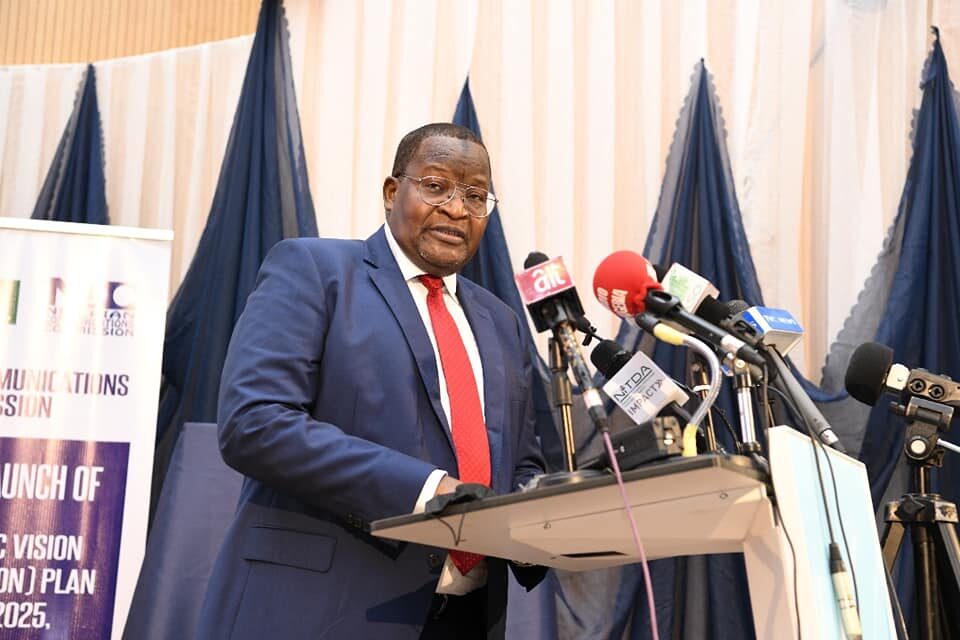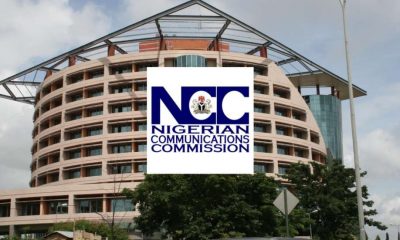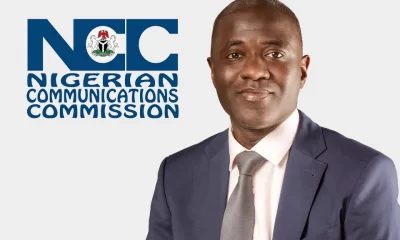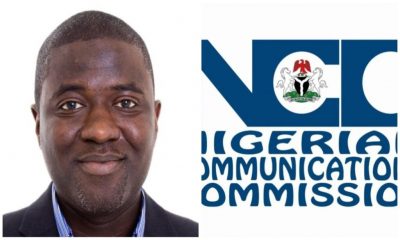Business
NCC’s efforts to improve broadband penetration yielding results—Danbatta
Published
7 months agoon

Executive Chairman of the Nigerian Communications Commission (NCC), Prof. Umar Danbatta, says the various efforts of the commission to improve broadband penetration are yielding fruitful results with the current estimates as at July 2023 standing at 47.01 per cent.
Prof. Danbatta who revealed this at media chat with executive editors and media chiefs in the northern part of the country, informed them that Fifth Generation (5G) services subscriptions have already hit half a million in subscription.
Using the extant reviewed five-pillar Strategic Vision Plan as building block, the EVC spoke on the 119 milestones achieved under the five strategic pillars, including regulatory excellence, universal broadband, market development, digital economy and strategic collaboration.
Danbatta said through effective implementation of NCC’s mandates under his leadership and cooperation of internal and external stakeholders since 2015, telecommunications industry in Nigeria has achieved remarkable milestones under his leadership.
READ ALSO: Multiple taxation may gave a negative impact on Nigeria’s economy – NCC
While reeling out impressive statistics that have characterized his leadership at NCC from 2015 to date, the EVC said active telephone subscribers had increased from less than 150.7 million to 218.9 million, representing a teledensity growth of 115.70 per cent from 107.87 per cent in 2015.
Through stimulating broadband infrastructure across the country, Danbatta said broadband penetration, which stood at 6 per cent in 2015 has increased significantly to 47.01 per cent as of July, 2023, enhancing over 89.73 million subscriptions on 3G, 4G and 5G networks in the country. Additionally, general Internet subscriptions have reached 159.5 million up from less than 100 million in 2015.
“Also, from 8 per cent contribution to the Gross Domestic Product (GDP) in 2015, telecommunications sector now contributes 16 per cent quarterly to the Nigerian economy as of the second quarter of 2023.
“Besides, following the authorization of more telecommunications companies to operate in Nigeria’s telecoms sector, the investments profile has increased tremendously from $38 billion in 2015 to $75 billion currently and this keeps growing daily. From the sales of Fifth Generation (5G) C-Band Spectrum, the NCC has generated over $847.8 million for the Federal Government,” he said.
Danbatta, who has received a gallery of awards nationally, regionally and globally in recognition of the outstanding performance of Nigeria’s telecom industry, also listed several achievements recorded since 2015.
READ ALSO: NCC alerts Nigerians on increase in electronic fraud on telecom platforms
“Other milestones and initiatives recorded aside the regulatory activities that culminated in the landmark launch of 5G services in Nigeria include the introduction of Spectrum Trading Guidelines, re-farming and re-planning certain spectrum band for efficiency, the emplaced collaborative process for the release of C-Band Spectrum by Nigerian Communications Satellite (NIGCOMSAT) Limited, and introduction of the Expanded Revenue Assurance Solution (ERAS) to address revenue leakages and improve government revenue from the telecoms industry.
“These initiatives also include Licensing of Satellite Earth Stations, issuing of operating licence to SpaceX Satellite, facilitating the landing of additional submarine Cables, such as the Google 2,000km Equiano subsea Internet cable in 2022, listing of MTN on the Nigerian bourse, licensing of Mobile Virtual Network Operators (MVNOs), introduction of new unlicensed millimeter wave spectrum, and regulation of white space spectrum,” Danbata said.
Also as part of NCC’s commitment under Danbatta’s leadership, the Commission has endowed professorial chairs in Nigerian universities and committed over N500 million naira to Research and Development (R&D) in the telecoms sector.
“The creation of the Digital Economy Department, the mandate to drive the implementation of the indigenous telecoms sector growth through the operation of the Nigeria Office for Developing Indigenous Telecom Sector (NODITS), are also important strides made by the Commission,” he said.
The NCC Chief Executive said the Commission has also taken very clear actions on consumer protection, advocacy, information-sharing and education.
However, Danbatta said while the industry still faces a number of challenges such as vandalism, securing equitable Right of Way (RoW) from governmental stakeholders, as well as multiple taxation and regulation, the Commission has put framework in place to work with necessary stakeholders to overcome the obstacles posed by these challenges and to sustain the growth trajectory which has been the hallmark of telecoms sector as an enabler of socio-economic development in Nigeria.
You may like


NCC, stakeholders to chart new path to effective telecoms regulation


NCC insist on disconnection SIMs SIMs without proper NIN linkage


NCC seeks joint West Africa regional protection of undersea cables


NCC realizes N8.6bn from sales of MVNO licenses


Voice, Data services affected by undersea cable cuts restored–NCC


NIMC, NCC unveil collaborative efforts to enhance NIN-SIM linkage processes
Trending

 Health & Fitness5 days ago
Health & Fitness5 days agoMalaria Vaccines in Africa: Pastor Chris Oyakhilome and the BBC Attack

 Aviation7 days ago
Aviation7 days agoWhy some airlines are avoiding Nigeria’s airspace–NAMA

 Aviation6 days ago
Aviation6 days agoJust in: Dana airline crash lands in Lagos

 Aviation6 days ago
Aviation6 days agoNSIB begins investigation into Dana Air after crash-landing incident

 Aviation6 days ago
Aviation6 days agoJust In: Dana Air plane crash-lands in Lagos

 Aviation5 days ago
Aviation5 days agoJust in: FG suspends all Dana Air operations

 Featured3 days ago
Featured3 days agoGov, Abiodun appoints Chess master, Onakoya sports ambassador

 Crime3 days ago
Crime3 days agoVandalism: Osun water corporation appeals to residents

